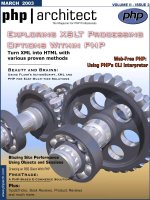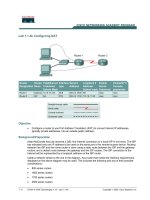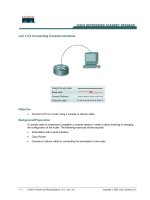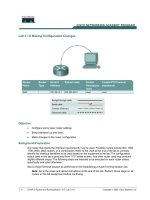Tài liệu Lab B: Processing Foreign Entries doc
Bạn đang xem bản rút gọn của tài liệu. Xem và tải ngay bản đầy đủ của tài liệu tại đây (151.43 KB, 4 trang )
Lab B: Processing Foreign Entries
Objectives
After completing this lab, you will be able to:
!
Manage changes to metadirectory data.
!
Create inclusion and exclusion filters to process connected directory entries
selectively.
!
Configure directory-specific options for a management agent.
!
Configure a management agent to process foreign entries.
Prerequisites
Before working on this lab, you must have:
!
Knowledge of template scripting.
!
Experience operating management agents.
Lab Setup
To complete this lab, you need the following:
!
MMS Server and MMS Compass installed.
!
Human Resources, Active Directory, and Microsoft Exchange 5.5 data
integrated into the metaverse namespace.
Estimated time to complete this lab: 15 minutes
2 Lab B: Processing Foreign Entries
BETA MATERIALS FOR MICROSOFT CERTIFIED TRAINER PREPARATION PURPOSES ONLY
Exercise 1
Updating a Connected Directory with Foreign User Information
In this exercise, you will update the Microsoft Exchange Server Global Address List with Custom
Recipients representing the aliases for the field agents working in the Claims and Investigations
departments.
Scenario
At Northwind Traders, there are two departments, Claims and Investigations, that consist mostly of
remote employees. These employees do not have an e-mail account in Microsoft Exchange Server
5.5. The other employees need to be able to easily find the remote employees contact information
and to send them e-mail messages.
Tasks Detailed steps
1.
Log on to Windows 2000,
start MMS Compass, and
then log on to your MMS
server.
a.
Log on to Windows 2000 as Administrator with a password of
password.
b.
Start MMS Compass, and then log on to your MMS server as
with a password of password.
2.
Review the foreign users
inclusion and exclusion
templates.
a.
In the control pane of MMS Compass, click Bookmarks, and then
click Management Agents.
b.
In the directory pane, click Exchange MA, and then in the control
pane, click Configure MA.
c.
In the Configure the Management Agent dialog box, on the
Inclusions and Exclusions tab, on the Foreign Entries tab, on the
Inclusions tab, review the eight inclusion rules.
d.
On the Inclusions and Exclusions tab, on the Foreign Entries tab, on
the Exclusions tab, review the five exclusion rules.
If there are both Inclusion and Exclusion templates that contain rules, which rules takes precedence?
First, the inclusion rules are processed and then the resultant entries are processed by the exclusion
rules.
3.
Configure the Custom
Recipients container as
follows:
• Custom recipient's
container: CN=Custom
Recipients,OU=serversi
te,O=domain (where
server is your computer
name and domain is
your domain name)
• Exchange Site Address
for X.400: c=US;a=
;p=domain;
a.
In the Configure the Management Agent dialog box, on the
Connected Directory Specifics tab, on the Custom Recipients tab, in
the Custom recipient's container box, type
CN=Custom Recipients,OU=serversite,O=domain (where server is
your computer name and domain is your domain name).
b.
In the Exchange Site Address for X.400 box, type
c=US;a= ;p=domain; (there must be a space only between a= and ;)
and then click OK.
Lab B: Processing Foreign Entries 3
BETA MATERIALS FOR MICROSOFT CERTIFIED TRAINER PREPARATION PURPOSES ONLY
Tasks Detailed Steps
4.
Comment out the ou
attribute in the Add and
Modify Foreign Entries
Output templates.
a.
In the control pane, click Design MA.
b.
In the Design MA dialog box, on the Connected Directory Foreign
Entries tab, on the Foreign Entries Output Templates tab, on the
Add tab, comment out the line for the ou attribute assignment. The
commented out line must read as follows:
# (-ou: $v_ou)
c.
Using step b as a guide, comment out the ou attribute line in the
template on the Modify tab.
d.
Click OK to close the Design MA dialog box.
5.
Run the Exchange
management agent
configured to only export
the foreign users and update
Microsoft Exchange.
a.
In the control pane, click Operate MA.
b.
In the Operate the Management Agent dialog box, on the
Operational Settings tab, under Tasks to Run, ensure that the Update
Microsoft Exchange check box is checked, and then clear all the other
check boxes.
c.
Under Types of Objects to Process, select the Process Custom
Recipients check box, and then clear all the other check boxes.
d.
On the Management Agent Logs tab, display the Operator’s Log tab.
e.
Click Run the Management Agent.
The Operator's Log displays the management agent's progress.
6.
Verify the Exchange Global
Address List has been
updated by checking the
management agent export
file and checking directly in
Exchange Administrator.
a.
In the Operate the Management Agent dialog box, on the
Intermediate Files tab, on the Connected Directory Update Files
tab, on the Custom Recipients tab, view the export information, and
then click OK.
b.
Start Microsoft Exchange Administrator from the Microsoft Exchange
menu.
c.
In the Microsoft Exchange Administrator window, click Custom
Recipients.
d.
Double-click Adri Duhem.
e.
In the Adri Duhem Properties dialog box, on the Phone/Notes tab,
verify that a telephone number exists.
f.
Click Cancel to close the Adri Duhem Properties dialog box.
7.
Close MMS Compass, and
then log off of
Windows 2000.
a.
Close MMS Compass, and then close any open windows.
b.
Log off of Windows 2000.
THIS PAGE INTENTIONALLY LEFT BLANK









